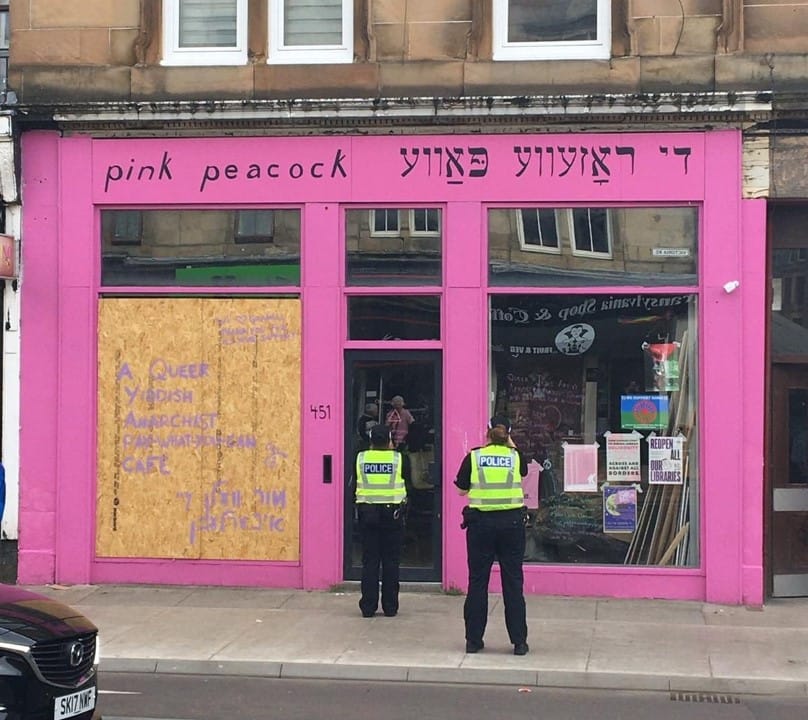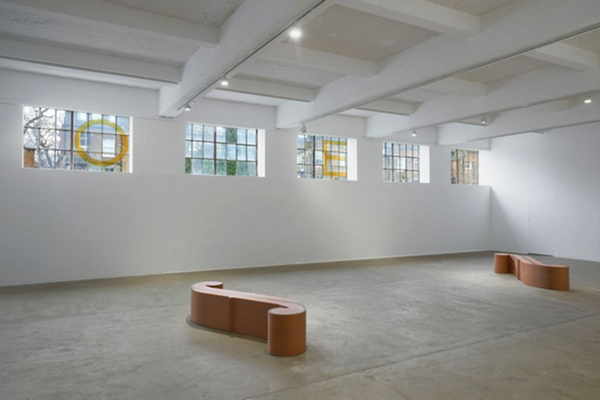Pink Peacock faces criminal charges over “F*** the police” tote bag
Britain’s police power trip continues apace as the co-owner of the Glasgow café is charged with a breach of the peace.

Pink Peacock hasn’t even opened its doors and is already ruffling blue feathers.
On Monday at around 1.30pm, Morgan Holleb and Joe Isaac – founders of the Glasgow-based queer Yiddish anarchist pay-what-you-can café – were tucking into lunch and an episode of Star Trek when they received a visit from the police. The officers told the pair they were suspected of breaching the peace – for displaying a “fuck the police” tote bag in their shop window.
Holleb was uncertain whether the police were cautioning, charging or even arresting him. In footage obtained from a camera Holleb installed above his front door, the officers are ambiguous: “I’m gonna caution a charge of breach of the peace […] I’m gonna charge you, but before I charge you, I’m going to caution you.” What was clear to Holleb – who spoke to Vashti via Zoom – was that “what they [the police] were really doing was […] trying to intimidate us.”
The officers handed Holleb neither a formal caution nor a charge sheet, only a calling card on which they’d ticked a box labelled “Incident reported” (in police jargon, an “incident” is an event the police are unsure is criminal). Holleb only realised he’d been charged with a crime after seeing a story in the Glasgow Times.
Five minutes after leaving, the officers were back. They told Holleb they needed to seize the tote bag as evidence, and to escort him to the café to retrieve it. “Okay,” Holleb thought, “we’ll make a spectacle out of it then.”
The spectacle was captured by Isaac and posted on the café’s Twitter:
With its hot pink facade and spicy signage, Pink Peacock has become a magnet for the culture warfare raging in Scotland and across the country. Tuesday’s episode is the third the café has fended off in less than a week.
On Wednesday, the Scottish Sun published a hit piece on the “anarchy diner”, saying it had “sparked fury by banning cops and ‘terfs’” [Editor’s note: We have hyperlinked to a Wayback Machine capture of the article so as not to direct traffic to the Sun]. The following night, a man painted over the shop front, which also had its window smashed on 27 May, though it is unclear whether the attack was targeted.
Still, Holleb is keen to emphasise that opposition to the café is far less than he expected – they’ve conducted dozens of risk assessments for every eventuality, virtually none of which they have had to use – and predominantly online. In the seven months the shop has been on Victoria Road, only one person has been hostile face-to-face: an older woman who entered while Holleb was painting and told him to take down the tote bag. He refused, and offered to explain why. The conversation ended at an amicable impasse: “She accepted that we weren’t just being contrarians.”
Holleb is also hesitant to overstate the policing of Pink Peacock as “a majority-white organisation”: “I felt safe to be sassy back to them,” he said. Others in Govanhill – an area ranked among the 10% most deprived in Scotland, and with a large south Asian population – do not. When Hussein Mitha (he/they), a Muslim person of colour, photographed the officers standing outside the café, they followed them into a nearby hardware shop and questioned them. When Mitha refused to engage, the officers told him not to be aggressive, and teased him about his hat. Thankfully, the incident didn’t escalate. Both Holleb and Mitha say that mistrust of the police is widespread across Glasgow’s Southside – “The cops are not recognised as people that keep the community safe,” said Mitha – it’s just that Pink Peacock feels more able to advertise it. “We don’t have the same vulnerability as other groups,” said Holleb.
This is not the first time police have attempted to criminalise leftists for strongly worded posters. In 2010, David Hoffman – a photojournalist and well-known documenter of police brutality and the far right – was handcuffed in his east London home after displaying a poster of David Cameron with the word “wanker”. In 2017-18, Glasgow anarchist David McHarg was arrested twice for putting up a similar poster (it read: “Fuck off you Tory cunts”).
Kevin Blowe, campaigns coordinator for the Network for Police Monitoring (Netpol), is certain that in Holleb’s case, as in Hoffman and McHarg’s, the police’s charges have “no basis” in law. “This is the kind of genuine threat to freedom of expression from the state that is far more important than anything imagined by right-wing free speech culture warriors,” he said in an email to Vashti, adding that “Pink Peacock should seriously consider legal action against Police Scotland.”
A spokesperson from Police Scotland said:
Police in Glasgow received complaints from the public regarding an item displaying offensive language in the window of premises in the Victoria Road area of Govanhill.
We can confirm that a 32-year-old man [Editor’s note: Holleb uses he/him pronouns and is non-binary, which he made clear to the officers during their visit] has been charged in connection with a breach of the peace and the item has been removed from the premises.
Though not without historical precedent, it’s easy to see why Glasgow police might feel a particular need to assert their authority at this moment. About a month ago and just a few streets away from the café, officers cooperating with the Home Office were forced to release two men detained in an immigration removal van after hundreds of their neighbours blockaded it; one protester lay underneath the van for the entirety of the eight-hour standoff, while friends fed him water through a straw.
Though rooted in Govanhill’s history of immigration control, racialised policing and local activism, the Kenmure Street protest has become emblematic of the resistance to police power that has gathered pace nationwide over the past year, culminating in the Kill The Bill movement in March. Holleb partly credits this abolitionist surge with an upswell of solidarity towards the café.
Holleb says he and Isaac only discovered their shop front had been painted over on Friday morning, by which point someone had already cleaned it off. As hostility towards the café has intensified, so has generosity: in the past fortnight, the café has received over £3,000 in donations, and in the past three days, over 200 orders to its online shop. “It really feels like we’ve got the community on our side,” Holleb said.
Since the events of Tuesday, the café has sold out of the offending tote bag, which it intends to restock. The reverse of the bag – bearing the traditional Yiddish anarchist slogan daloy politsey, or “down with the police” – remains in the shop window.
Rivkah Brown is the editor of Vashti.




